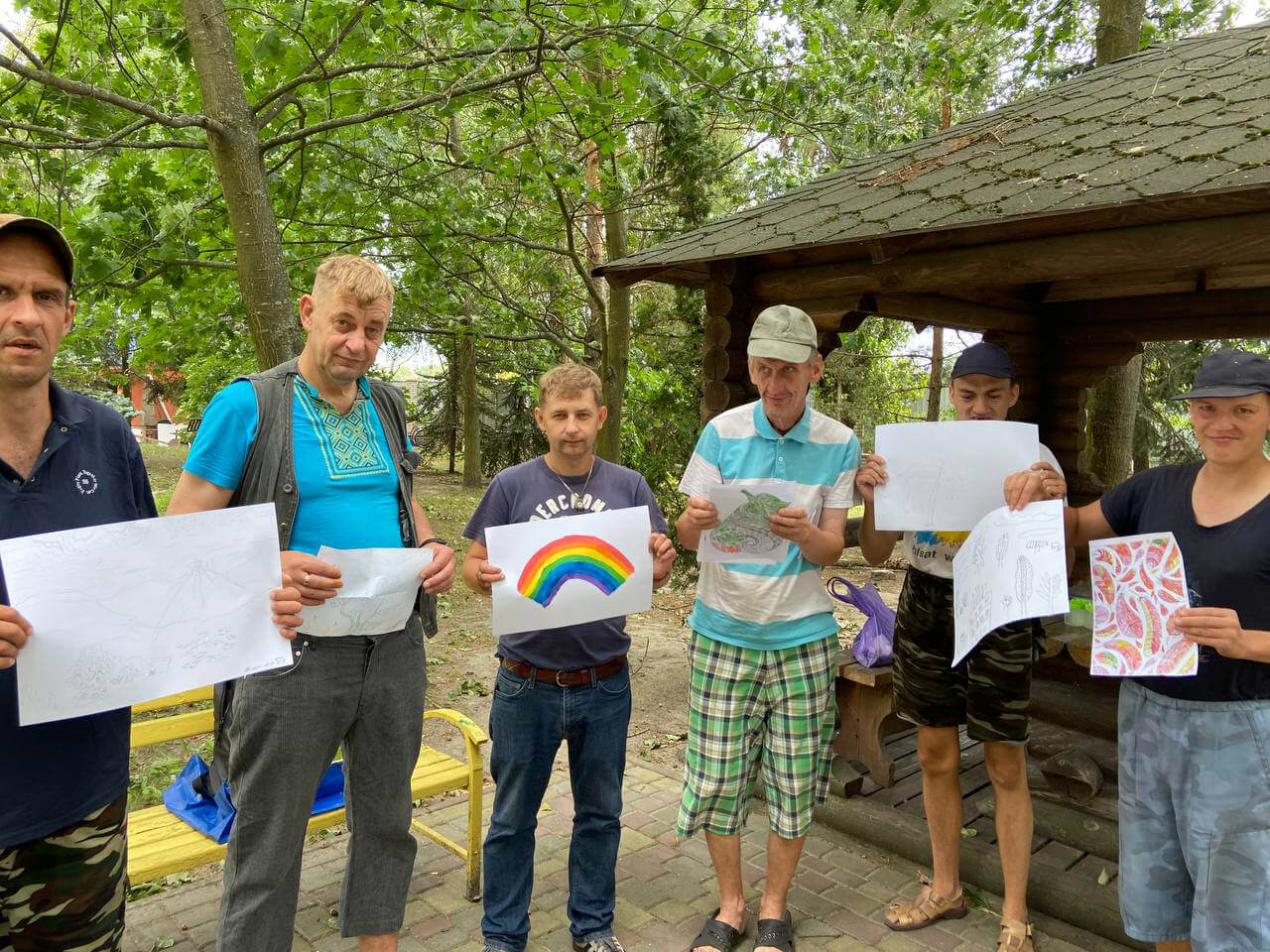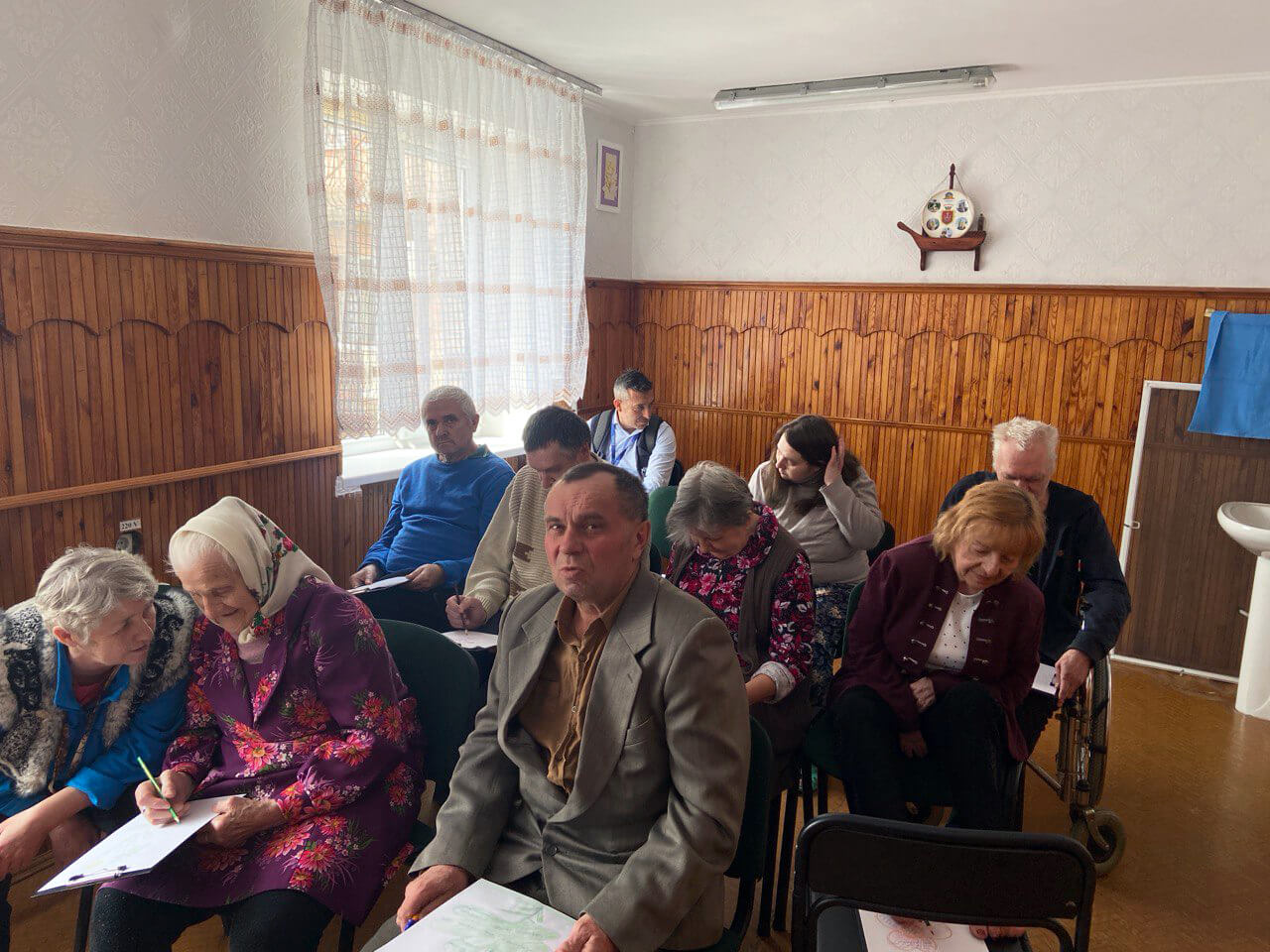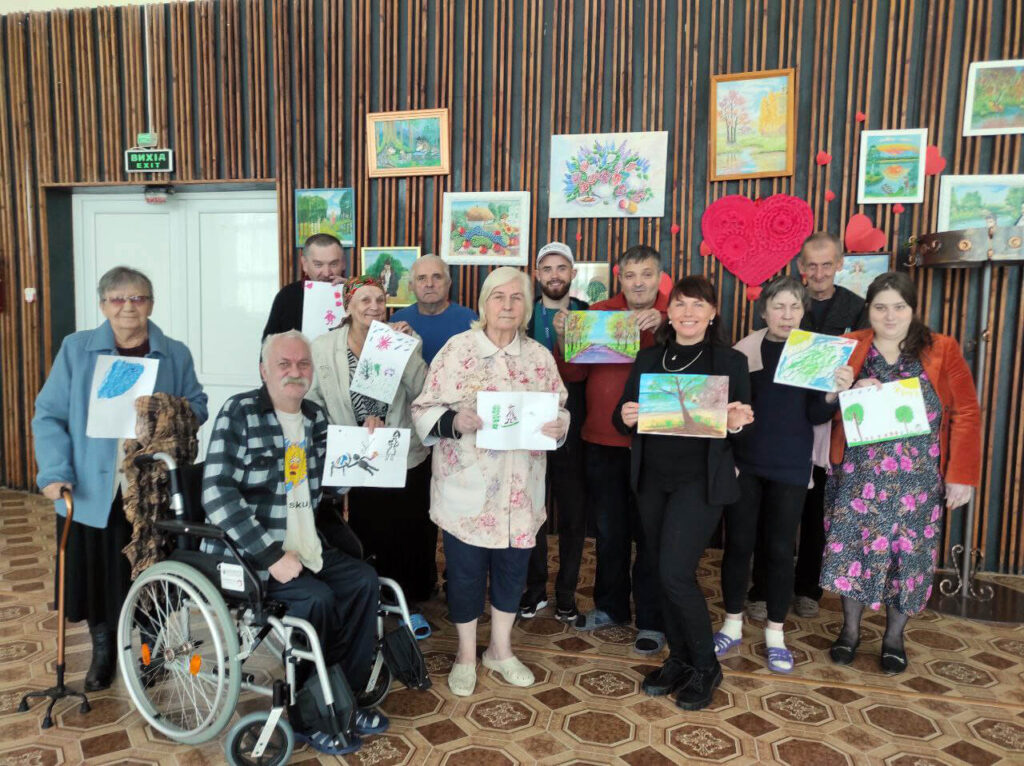The village of Borodianka is located 50 kilometers from the Ukrainian capital, Kyiv. The settlement came under heavy attack from Russian forces at the beginning of the invasion, which damaged scores of civilian buildings and killed hundreds of people. One of the damaged civilian facilities in Borodianka is a psychoneurological residential-care institution with a geriatric division. The institution was heavily shelled during the fighting, and lost its water, gas and electricity supplies. The residents of the care home—many of them older persons and those with special needs—spent about 20 days under occupation, surrounded by Russian troops, with no possibility of evacuating.
After Borodianka was liberated, International Medical Corps sent in an assessment team to figure out the village’s needs, leading our mental health and psychosocial support (MHPSS) team to begin work at the institution in August 2022. Since then, our staff members have heard numerous stories of loss and grief from the residents, many of whom were affected by the war in some way.
One such resident is 39-year-old Maksym (not his real name), an individual suffering from a severe mental health condition who has lived in the care home for eight years. Before the invasion, he loved writing poetry and playing the piano. He even started writing a book and dreamed of publishing it. But when Russian forces invaded in February 2022, he got scared and wanted to run away.
But Maksym realized it wasn’t the right thing to do—and that the other residents needed help. He and a few other men risked their lives every day to fetch water from a nearby well. He often made a fire to help cook meals for everyone, and cared for the patients who couldn’t move. He even buried the bodies of those who couldn’t survive in such difficult conditions.

However, while he helped others, his own condition became critical. He suffered from the lack of medicine, from living in a cold basement and from constantly living in fear. He was anxious and stressed and suffered from insomnia and fatigue. He didn’t have any inspiration left to continue with his poetry. And he was heartbroken when his book burned in a fire started by the Russian forces.
Hanna, 86, is from Marinka in Donetsk—an oblast in the east of the country that has been occupied by opposing forces since 2014. Her house was destroyed during the invasion, so she moved to Kyiv to live with her nephew. However, after he joined the armed forces, Hanna had no one to take care of her, and joined the geriatric division at the institution. “I was alone without my family and cried every day,” she says. “I wished to die rather than live a life without purpose.”
Sixty-three-year-old Yevgen worked as an actor in Kharkiv. After invading forces destroyed his home, his family moved abroad for safety. But he couldn’t leave the country as easily, because he uses a wheelchair—so he, too, moved to the institution. He longed to be with his family and often thought about his life before the invasion. He felt lonely and shut himself off from those around him.
Mariia, 66, has lived with physical disabilities since childhood—she can’t use either of her hands. She and her 90-year-old mother fled the Donetsk region after the February invasion. Their house was destroyed, so they sought shelter at the institution. “I was distraught after losing our home,” she says. “I not only had to take care of myself while being physically challenged, but also look after my older mother—and that, too, in a new place surrounded by strangers.”
Activities Provide Creative Outlet, Make Bonding Easier
To help the residents overcome their fear and negativity, our MHPSS team offers art-based activities and emotional support groups that provide a way for the residents to express their creativity and make new friends. Maksym is one of the residents who has benefited from this support. MHPSS Case Worker and Psychologist Mykola Kravchenko worked with him for four months to help improve his mental health. He discovered that Maksym’s strengths were his creative talents and a strong desire to rise against all odds.
Understanding that structure is essential for people suffering from long-term mental health conditions , Kravchenko helped Maksym create a schedule around his daily life based on his talents, needs and capabilities. Kravchenko specified time slots dedicated to different activities so that Maksym could follow a fixed routine every day without exhausting his mental energy. With some symmetry back in his life, Maksym slowly started playing the piano again—and even arranged concerts for other patients to attend. He also started organizing events at the institution. Because he is fluent in English, he plans to provide English lessons and start speaking clubs for the residents. “I am open to giving them piano lessons, too, and I’d like to start my book again and finally publish it,” he says with newfound confidence. The MHPSS team is proud of Maksym’s progress. “His journey shows how important MHPSS support is,” Kravchenko says.
To help older residents of the institution overcome the horrors of war, our MHPSS team started the Active Longevity Program to help older people understand that life can be exciting and inspiring at any age. About 15 of them—aged 50–86 years—participated in the program for four months. Some of them have dementia and sclerosis, some use wheelchairs, and all initially seemed sad and lonely, as if they had lost their willingness to live. They felt useless and seemed indifferent to their surroundings. “I felt it was my mission to help them regain an interest in life and show them its other side, which can be wonderful and beautiful,” Kravchenko explains.


The longevity program, which began in May, comprised 10 sessions designed to help participants find their strengths, develop a positive attitude toward life and create an atmosphere of trust. The topics included confidence-building and self-expression, a connection between physical and mental health, and the importance of talking openly about emotions and life events.
The first few sessions were challenging, as the participants did not fully trust one another. They didn’t speak much and mainly kept to themselves. But after the MHPSS team managed to create a positive atmosphere in the group, gradually the participants started to express their feelings through art-based activities, discussions and meditation. They learned to embrace their emotions, no matter how difficult and frustrating they were, while respecting the sentiments of their peers. Kravchenko initiated discussions about their past and how they used to help themselves before they arrived at the institution. They talked about their childhood—when they felt protected within their families—and relied on these good memories to improve their present state.
Kravchenko also taught them self-confidence and recovery through activities involving imagination. He asked them to imagine themselves as clouds wandering through the sky, feeling relaxed and calm. “I told them to remember this feeling and to do this exercise whenever they felt anxious or scared, so they could switch to their inner safe space,” he says. In addition, he taught them breathing and relaxation techniques.
Noticing and Appreciating Beauty
The participants started communicating with each other and spending more time together. Additionally, they started noticing and appreciating the beauty of nature. “I once asked the participants about their previous week, and they started talking about the wonderful time they spent outdoors,” Kravchenko says. “They described the birds and the smell of flowers, and mentioned how bright the sunshine was. They even started reading books together.”
Yevgen now recites poems to other group members. Together with Mariia, he has created an acting club where he and his talented peers perform plays regularly. The residents also play chess and other indoor games together.

The MHPSS program has united strangers—most in the autumn or winter of their lives—in ways they had not imagined. Forced from families and friends, they now have a new home, and they treat their peers and the institution’s staff as their own family. “The most heartwarming thing is that they have finally started to smile,” Kravchenko adds.
Learn more about MHPSS and other services we provide in Ukraine.
